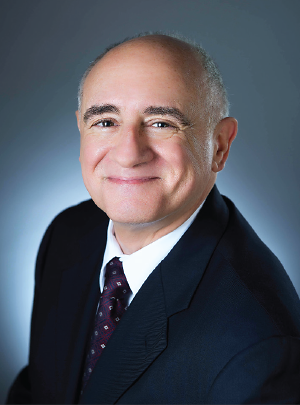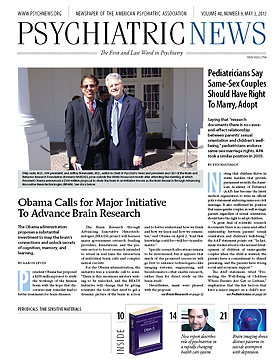As a child, the tagline for the favorite TV show of Philip Muskin, M.D., could aptly describe the most poignant aspects of his future career as a clinician and educator in psychosomatic medicine: “Man, woman, birth, death, infinity.”
“Ben Casey” was a medical-drama series airing in the early 1960s starring Vincent Edwards as a determined and idealistic surgeon. Muskin, having survived a bout with polio at a young age, was inspired by the lifesaving skills of that heroic TV doctor.
His trajectory toward psychiatry was further fueled by the influence of his father, a psychologist whose bookshelves were filled with Sigmund Freud’s writings. “I found Freud fascinating,” Muskin told Psychiatric News. “The idea of helping people to understand themselves was very appealing to me.”
After studying depth perception at the New School for Social Research as a graduate student, Muskin completed medical school at New York Medical College, followed by an internship in internal medicine at the Metropolitan Hospital Center in New York and a psychiatry residency at the New York State Psychiatric Institute. He received psychoanalytic training at Columbia University Psychoanalytic Center. Muskin was also awarded a National Institute of Mental Health fellowship in consultation-liaison psychiatry.
Today, as a professor of clinical psychiatry and chief of the consultation-liaison psychiatry service at Columbia University Medical Center, he treats patients with physical illnesses who may have psychiatric disorders or are struggling with life-threatening conditions and teaches residents to do the same. He also maintains a private practice.
Not for the Faint of Heart
While he acknowledged that it is not work for the faint of heart, “It’s rewarding to walk onto a medical or surgical ward and be part of the team,” Muskin said. While some of his patients may have a combination of general medical and psychiatric diagnoses—schizophrenia and pneumonia or borderline personality disorder and diabetes, for instance—some may need help coping with end-of-life issues.
For example, Muskin and his residents recently saw a patient in the intensive care unit who at age 48 had just been told she had only months to live. “She knows she is going to die. She has a 21-year-old daughter in her final year of college and wants to make sure that her daughter will be okay.” Muskin said his job at that point is to sit with the patient as she faces the painful emotions inherent in a terminal diagnosis. “I teach my residents that it’s OK to cry with their patients and that this work is often emotionally taxing,” he said. He also began working with a young woman with cystic fibrosis who received a lung transplant, and he has helped her cope with anxiety and other issues related to her significant medical issues.
When one of the psychiatry residents rotating through the consultation-liaison service is asked to see a patient on a medical or surgical unit, the patient may not be expecting to see a psychiatrist, Muskin noted, so he teaches the residents to ask what, if anything, the referring doctor has told the patient about the resident’s visit. “Many times, the answer is ‘I didn’t tell the patient anything,’ because the physician does not know how to raise the issue of potential mental health problems with their patients,” he said. Ideally, the referring physician tells the patient that a visit from a psychiatrist can ensure that he or she is getting the best medical care possible, and Muskin is often able to help his nonpsychiatric colleagues have this conversation with their patients who need a psychiatric consultation.
Fundraising Is Crucial Activity
In addition to educating the next generation of psychiatrists in this field, Muskin goes the extra mile to secure the future of the subspecialty as chair of the Board of Directors of the Foundation of the Academy of Psychosomatic Medicine (fAPM), a 501(c)3 charitable organization. The academy was founded 50 years ago to promote excellence in clinical care for patients with coexisting psychiatric and general medical conditions by promoting research and education in psychosomatic medicine.
“The reality is that there is very little federal funding for trainees in psychosomatic medicine,” Muskin said, and pharmaceutical-industry funding for research and fellowships across psychiatry and medicine in general is also dwindling. This means that much of the funding for fellowships and research in psychosomatic medicine must come from private donations.
Early Career Psychiatrists Supported
Each year, fAPM leaders hold events at the annual meeting of the Academy of Psychosomatic Medicine to raise funds for competitive fellowships to support early career psychiatrists in psychosomatic medicine. In addition, there is the 100% Campaign, which tries to raise $100 from each member of the academy toward this goal and has raised about $60,000 so far. The funding has supported the Webb Fellowship Program, in which early career psychiatrists receive a small award to support their attendance at the academy’s annual meeting and to support mentorship as they conduct research on psychosomatic medicine.
However, the awards are relatively small, and Muskin is interested in approaching large charitable organizations to urge them to match existing funds raised by the foundation to support the fellowships on a permanent basis. “Supporting our colleagues is part of what we do as psychiatrists,” Muskin said. “All of us have been lucky enough to have trained in psychiatry and to practice—shouldn’t we want the same for the next generation of psychiatrists?”
In addition to his other professional activities, Muskin chaired the Scientific Program Committee for the APA annual meeting from 2000 to 2002. ■

